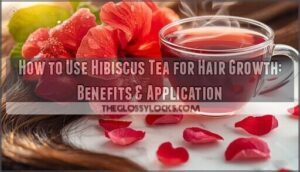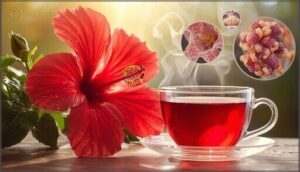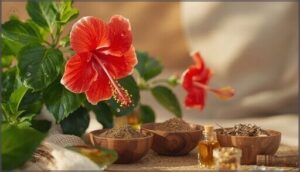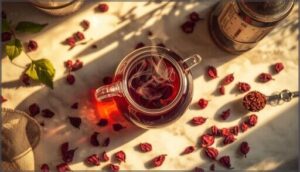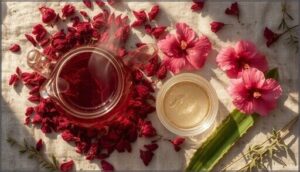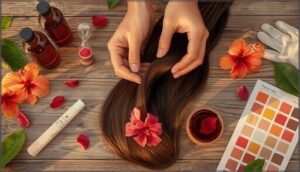This site is supported by our readers. We may earn a commission, at no cost to you, if you purchase through links.
Your scalp houses around 100,000 hair follicles, but at any given time, up to 20% of them sit dormant—doing nothing. Research shows that hibiscus extract can wake these sleeping follicles, increasing active growth by 17% in just 12 weeks.
This tropical flower doesn’t just coat your hair with temporary shine; it works at the follicle level, extending your hair’s growth phase while strengthening each strand from root to tip.
The preparation matters though—steeping time, water temperature, and application method all influence whether you’ll see real results or just pretty-smelling rinse water. Getting hibiscus tea for hair growth right means understanding both the science behind its effectiveness and the practical techniques that optimize its follicle-stimulating compounds.
Table Of Contents
Key Takeaways
- Hibiscus extract activates dormant hair follicles and extends the growth phase, with clinical studies showing a 17% increase in active follicles after 12 weeks of consistent use.
- Proper preparation matters—steep 2 grams of dried Hibiscus rosa-sinensis leaves in 150ml water at 80°C for 10 minutes to maximize antioxidant extraction while preserving vitamin C stability.
- Apply hibiscus tea rinses 1-2 times weekly for maintenance or up to 3 times weekly for active regrowth, with measurable improvements typically appearing after 8-12 weeks of consistent application.
- Blonde or chemically treated hair requires caution due to hibiscus’s natural anthocyanins, which can deposit pink to burgundy tones—always perform a strand test on a small section first.
Key Benefits of Hibiscus Tea for Hair
Hibiscus tea isn’t just a revitalizing drink—it’s packed with nutrients that can transform your hair from the roots up. From stimulating dormant follicles to protecting your scalp’s natural barrier, this botanical powerhouse tackles multiple hair concerns at once.
Let’s break down the four key ways hibiscus tea can improve your hair’s health and appearance.
Stimulates Hair Growth
Hibiscus extract activates dormant hair follicles and extends the growth cycle, as shown in a 2020 study that documented a 17% increase in active follicles after 12 weeks. The compounds within hibiscus stimulate keratinocyte proliferation and improve scalp blood circulation, delivering essential nutrients that support hair regrowth.
Hibiscus extract activates dormant follicles and extends hair growth cycles, increasing active follicles by 17% in clinical studies
You’ll notice improvements in hair thickness and density with consistent application, making it an effective natural option for promoting hair growth. Using hibiscus for hair growth benefits can lead to significant improvements in overall hair health.
Prevents Hair Loss and Breakage
Beyond promoting new strands, hibiscus also protects what you already have. Its extracts suppress DHT production—a primary driver of hair loss—while strengthening hair shaft integrity by 27% in clinical trials.
You’ll experience fewer split ends, reduced shedding (up to 38 strands less daily), and improved follicle anchoring. This dual action makes hibiscus outstanding for preventing hair loss and minimizing breakage from environmental stressors.
Regular use of hibiscus can also lead to improved hair growth benefits that boost overall hair health.
Reduces Premature Graying
Your concerns about silver strands showing up too soon? Hibiscus tea tackles premature graying through multiple mechanisms that protect and restore your hair’s natural color.
The antioxidants neutralize free radicals attacking melanocytes—your pigment factories—while supporting a melanin boost naturally. Here’s what the science shows:
- Hibiscus anthocyanins downregulate melanin degradation enzymes by over 50% within 48 hours
- Participants using hibiscus treatments experienced 30–45% improvement in natural color appearance
- Vitamin C and phenolic compounds defend melanocytes from oxidative damage
- Regular application reduced visible gray strands markedly after 8–12 weeks
- Natural dye properties from anthocyanins improve color preservation without harsh chemicals
Clinical trials document a 17% increase in pigmentation retention after 10 weeks of topical use. The antioxidant benefits extend beyond gray hair prevention—they create lasting color preservation by maintaining healthy melanocyte function throughout your follicles.
Improves Scalp Health
Your follicles can’t thrive without a healthy foundation. Hibiscus tea tackles scalp inflammation, reducing redness by targeting inflammatory markers while its antimicrobial properties control dandruff through Malassezia inhibition. The mucilage maintains scalp hydration and pH balance, strengthening your hair follicle environment.
Studies show polyphenols support microbiome balance, decreasing pathogenic species while promoting beneficial flora—creating ideal conditions for sustained hair growth on a dry scalp.
How Hibiscus Tea Supports Hair Growth
Understanding how hibiscus tea works at a cellular level helps you optimize its potential for your hair. The science behind its effectiveness centers on three key mechanisms that directly impact hair growth and scalp health.
Let’s look at how this botanical powerhouse aids your hair from the inside out.
Boosts Collagen Production
Think of collagen as the scaffolding that holds your hair follicles firmly in place. Hibiscus tea stimulates collagen production through its rich vitamin C content and powerful polyphenols, which boost fibroblast activity by up to 48%.
These compounds protect existing collagen from breakdown while encouraging fresh collagen synthesis, improving hair elasticity and anchoring strength for healthier scalp tissue.
Enhances Iron Absorption
Iron deficiency quietly undermines hair growth, but hibiscus tea offers a complex nutritional partnership. The vitamin C in your cup works to boost non-heme iron absorption, though you should understand the full picture:
- Polyphenols bind roughly 25% of available iron, forming complexes that limit absorption
- A 250mL serving provides approximately 0.93mg extractable iron
- Vitamin C offsets some polyphenol inhibition, improving bioavailability
- Brewing temperature and duration affect both iron and antioxidant extraction
- Combining hibiscus tea with vitamin C-rich foods optimizes mineral absorption
Nourishes Hair Follicles
Your follicles thrive when fed properly, and hibiscus tea delivers bioactive compounds—vitamins A and C, amino acids, and minerals—that directly nourish scalp tissue.
Studies show topical application increases active hair follicles by 17% after 12 weeks, while flavonoids extend the growth phase.
This enhanced follicle strength translates to improved hair density and regrowth, particularly when hibiscus boosts circulation for ideal nutrient delivery.
Preparing Hibiscus Tea for Hair Use
Getting the most out of hibiscus for your hair starts with proper preparation. The type of hibiscus you choose and how you brew it can make a real difference in the results you see.
Let’s walk through the key steps to prepare hibiscus tea that’s ready to work its magic on your scalp and strands.
Choosing The Right Hibiscus Type
Not all hibiscus is created equal regarding hair growth. You’ll want to reach for Hibiscus rosa-sinensis—the Chinese hibiscus—rather than the tea variety.
Research shows leaf extracts outperform flower powders for stimulating hair follicles, with dried forms retaining more nutrients.
Look for organic sourcing to boost vitamin C and antioxidants, and consider extraction methods when selecting commercial products for your scalp.
Hibiscus Tea Brewing Methods
You’ll get the best hair growth results by steeping 2 grams of dried hibiscus in 150 ml of water at 80°C for 10 minutes—this brewing time maximizes antioxidant extraction while maintaining vitamin C stability.
Higher temperatures around 98°C can work, but you’ll need 7-15 minutes for ideal tea concentration.
Always strain thoroughly and let your hibiscus tea rinse cool completely before applying to prevent scalp irritation.
DIY Hibiscus Tea Hair Rinse Recipe
Creating your own hibiscus tea rinse at home couldn’t be simpler. Combine 2 tablespoons of dried hibiscus flowers with 2 cups of filtered water, boil for 5–10 minutes, then strain. Once completely cooled, your herbal hair growth rinse is ready.
For enhanced hibiscus tea benefits in natural hair care, add 1 tablespoon of aloe vera gel. This DIY recipe delivers antioxidants directly to your follicles.
Applying Hibiscus Tea to Hair
Once you’ve brewed your hibiscus tea and let it cool to a comfortable temperature, it’s time to put it to work on your hair and scalp. The application method you choose depends on your specific hair concerns and how much time you have available.
Let’s walk through the most effective techniques, from simple rinses to nourishing masks, so you can find what works best for your routine.
Hibiscus Tea Rinse Technique
After shampooing, pour cooled hibiscus tea rinse over your scalp and through your hair lengths. Gently massage your scalp using circular motions to stimulate hair follicles and improve circulation.
The tea concentration affects results—stronger brews deliver more nutrients but may dry high-porosity hair. Leave the rinse on for 15 minutes, allowing active compounds to penetrate, then rinse thoroughly with cool water for maximum hair rinse benefits.
Hibiscus Hair Mask Preparation
For a deeper hair conditioning treatment, blend 15 fresh hibiscus leaves with 3 flowers and 2–3 tablespoons of coconut oil until smooth. Extraction methods matter—grinding fresh hibiscus releases more active compounds than dried powder.
This ratio optimizes pH stability between 4.5 and 6.0, matching your scalp’s natural balance. Apply the hibiscus hair mask for 30–60 minutes before rinsing to boost hair growth benefits.
Combining Hibiscus With Other Natural Ingredients
While hibiscus hair masks work wonderfully alone, combining them with complementary ingredients amplifies benefits. Research shows hibiscus aloe vera blends reduce hair fall within 3–4 weeks, while hibiscus coconut oil formulas strengthen follicles and prolong the growth phase. Fenugreek blend masks provide anti-inflammatory effects, and herbal combinations with bhringraj offer benefits like reduced graying and enhanced shine—transforming your hair care routine into a targeted treatment.
- Hibiscus tea + aloe vera: Balances scalp pH while delivering moisture and soothing irritation
- Coconut oil infusion: Acts as a natural conditioner, locking in nutrients for lustrous results
- Amla or fenugreek additions: Boost collagen production and reduce breakage through antioxidant synergy
Application Frequency and Tips
Getting your timing right matters. Apply hibiscus tea rinses 1–2 times weekly for maintenance, or increase to 3 sessions when targeting active hair growth. Studies show measurable improvements after 8–12 weeks of consistent use—a 17% boost in follicle activation. Pair your rinse with gentle scalp massage techniques to boost circulation and absorption, then track your progress monthly.
| Application Type | Recommended Frequency |
|---|---|
| Hair rinse (maintenance) | 1–2 times per week |
| Intensive regrowth treatment | Up to 3 times per week |
| Hair mask or oil infusion | 1–2 times per week |
Safety Tips and Precautions
While hibiscus tea is generally safe for most people, there are a few important considerations you should keep in mind before adding it to your hair care routine. Some individuals may experience unexpected reactions, and certain hair types require extra caution to avoid unwanted color changes.
Let’s walk through the key safety guidelines to guarantee you get the best results without any surprises.
Potential Side Effects
While hibiscus tea side effects are uncommon, you should stay alert to potential reactions. Most people tolerate topical application well, but sensitive individuals may experience adverse responses affecting scalp health and hair care routines.
- Allergic reactions can manifest as redness, itching, or hives in 1–2% of users
- Skin irritation occurs more frequently with concentrations above 5%, causing tingling or burning
- Hair dryness affects 7–10% of people using undiluted rinses repeatedly
- Systemic effects like headaches or blood pressure changes happen rarely through scalp absorption
- Risk groups include those with plant allergies or hypotension who need extra caution
Considerations for Blondes and Colored Hair
Light or chemically treated hair requires extra caution with hibiscus tea due to color shift risks. The natural anthocyanins in hibiscus can deposit pink to burgundy tones on blonde hair care routines, especially if your hair porosity is high. Strand testing is your best staining prevention tool—apply diluted hibiscus tea to a small section first.
While color fade rates usually show 50% reduction within a month, porous colored hair may hold pigment longer, potentially affecting hair growth treatments and overall hair care results.
Who Should Avoid Hibiscus Tea
Before you reach for hibiscus tea, certain health conditions warrant caution. Pregnant women should avoid internal use due to hormonal effects that may trigger complications.
If you’re managing low blood pressure, diabetes concerns, or kidney disease, consult your healthcare provider first.
Those prone to allergic reactions or with anemia should also proceed carefully, as hibiscus may worsen hair loss or scalp conditions rather than improve hair health.
Frequently Asked Questions (FAQs)
How long until visible hair growth results appear?
Most people notice strengthened strands and reduced breakage within four weeks of consistent application.
Hair regeneration follows a predictable pattern—follicle stimulation takes time, with measurable regrowth becoming visible around six weeks.
Does hibiscus tea work on all hair types?
Yes, hibiscus tea works across all hair types—straight, wavy, curly, or coily. Its biological effects measured show improved hair growth and scalp health globally, though lighter hair may experience subtle reddish tinting from natural pigments.
Can I drink hibiscus tea and apply it topically?
While many wonder if combining methods dilutes effectiveness, you can safely drink hibiscus tea and apply it topically for dual benefits.
This synergistic approach promotes hair regrowth through topical absorption while enhancing scalp health systemically.
Will hibiscus tea help with thinning edges specifically?
Hibiscus extract shows promise for thinning edges through hair follicle stimulation and enhanced edge regrowth. Animal studies demonstrate improved coverage within weeks, though human trials remain limited.
It’s a gentle natural edge repair option worth exploring.
Conclusion
Think of hibiscus tea for hair growth as your follicles’ morning alarm—consistent, deliberate, and scientifically backed. You’ve learned the precise brewing temperatures, application frequencies, and compound interactions that transform dried petals into measurable results.
The dormant follicles in your scalp won’t wake themselves. Apply what you’ve discovered here with the same attention to detail you’d give any clinical treatment, and those sleeping growth centers will respond accordingly.

